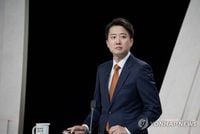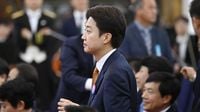A petition demanding the impeachment of Lee Jun-seok, a lawmaker from the Reform Party, has rapidly gained traction in South Korea, stirring a fierce political debate and prompting formal review by the National Assembly. The petition, sparked by Lee's controversial remarks during the June 3, 2025, presidential TV debate, accuses him of using violent and misogynistic language related to women's bodies to attack an opposing candidate.
Launched on June 4, 2025, the "Petition on the Impeachment of Lawmaker Lee Jun-seok" quickly amassed over 160,000 signatures within just two days, far surpassing the 50,000-signature threshold required for parliamentary consideration. As of June 6, 2025, the petition had secured approximately 150,000 to 160,000 endorsements, depending on the reporting source, signaling widespread public concern and outrage.
According to South Korean parliamentary law, a national petition that garners at least 50,000 signatures within 30 days of its posting must be reviewed by the relevant standing committee of the National Assembly. While the specific committee tasked with this review has yet to be determined, the petition's rapid growth ensures it will receive serious legislative scrutiny.
The petition charges Lee Jun-seok with violating both the Constitution and parliamentary law by engaging in language that trivialized sexual violence during the televised debate. It asserts that Lee's remarks not only degraded the issue of sexual violence but also severely damaged the dignity of the National Assembly and undermined the trust of the sovereign citizens he represents.
For Lee Jun-seok to be formally impeached and removed from office, a rigorous process requires approval from more than two-thirds of the incumbent National Assembly members, making the path to impeachment challenging but not impossible.
The controversy traces back to the final presidential debate on May 27, 2025, where Lee, then the Reform Party's presidential candidate, reportedly used violent expressions related to women's bodies in an attempt to attack his opponent. This sparked immediate backlash, with citizens initiating the impeachment petition just days later.
In response to the mounting pressure, Lee Jun-seok vehemently denied wrongdoing, framing the impeachment efforts as "a desert of Lee Jae-myung-style dictatorship." He invoked a famous saying from former President Kim Young-sam: "Dawn comes even if you twist the neck of a rooster," pledging to "fight fiercely" against what he perceives as political persecution.
Meanwhile, the Reform Party's acting leader and floor leader, Chun Ha-ram, acknowledged the negative impact of the TV debate controversy on the party's public standing during an interview on KBS Radio. He admitted, "Such a TV debate controversy was not ultimately helpful," noting that the party's approval ratings dipped temporarily after the debate before recovering somewhat.
Chun analyzed that the controversy triggered a "psychology of preventing a landslide defeat" among voters, implying that some supporters rallied to avoid a total loss despite reservations. He also candidly assessed the party's internal challenges, stating, "Our party was somewhat lacking in adequately supporting this lawmaker," and suggesting that public doubts about the Reform Party's readiness played a role in diminishing Lee's competitive edge.
The petitioners and critics argue that Lee's conduct betrays the trust placed in public officials and violates the ethical standards expected of National Assembly members. They contend that the use of such language during a high-profile political event not only harms the dignity of the legislature but also disrespects victims of sexual violence and women at large.
As the National Assembly prepares to review the petition, the political atmosphere remains tense. The debate has exposed fractures within the Reform Party and raised questions about the conduct of politicians in South Korea's heated electoral environment.
Observers note that while the impeachment process is demanding, the significant public support for the petition reflects growing societal intolerance for misogynistic rhetoric and a push for greater accountability among elected officials.
In the coming weeks, the relevant standing committee's decision on whether to forward the petition to a plenary session will be pivotal. Should it proceed, the requirement of a two-thirds majority vote for impeachment will test the political alliances and convictions of lawmakers across party lines.
For now, Lee Jun-seok remains defiant, and the Reform Party grapples with the fallout. The controversy serves as a stark reminder of the high stakes and intense scrutiny faced by politicians in South Korea's vibrant democratic process.
As this story unfolds, it will undoubtedly shape discussions about political decorum, gender sensitivity, and the responsibilities of public servants in the nation's capital.





